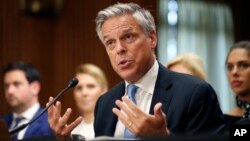Former Utah Gov. Jon Huntsman, President Donald Trump's nominee to be U.S. ambassador to Russia, told Congress on Tuesday that Moscow's meddling in the 2016 presidential election led directly to the lack of trust between the two former Cold War foes.
Appearing before the Senate Foreign Relations Committee, Huntsman struck a tough tone amid heightened tensions between Washington and Moscow. The relationship has been marred in recent months by a series of expulsions of diplomats and closures of diplomatic missions.
"There is no question that the Russian government interfered in the U.S. election last year and Moscow continues to meddle in the democratic processes of our friends and allies,'' said Huntsman, who also noted that Russia continues to disregard its commitments to arms control treaties.
"Right now we're at a low point,'' he said. "It reminds me of 1986.''
He said he would not hesitate to remind Russian officials that they are accountable for their actions. But he also said there are areas of possible cooperation and common interest for Russia and the United States, including defusing North Korea's nuclear ambitions and missions in space.
If his nomination is approved by the Senate, Huntsman would take over a high-profile post amid ongoing investigations by special counsel Robert Mueller into Russia's election intrusions and potential contacts between Russian officials and the Trump campaign.
Huntsman breezed through his confirmation hearing, with Republicans and Democrats hailing him as highly qualified for the job. He's a former Utah governor who has twice served as an ambassador. He was the nation's top diplomat to Singapore under President George H.W. Bush and then served in that role in China under President Barack Obama before returning to the U.S. to run for president in 2012.
Sen. Chris Murphy, D-Conn., asked Huntsman how he would confront the Russians over the election interference when Trump has called the meddling a hoax and a scam pushed by Democrats to sully his victory at the polls.
Huntsman said he'd rely on the work done by U.S. intelligence agencies, which concluded in a declassified report released in early January that Putin ordered an "influence campaign'' to weaken public faith in the U.S. political process and to damage Democrat Hillary Clinton's candidacy.
"I think that expresses where the facts are with respect to Russia's involvement in our election,'' he said.
The former governor, a Mormon, had an up-and-down relationship with Trump during last year's campaign. He was slow to endorse any candidate for the Republican nomination though he did back Trump once he became the presumptive nominee. But Huntsman then called for Trump to drop out after the October release of a 2005 video in which Trump was captured on a hot microphone making lewd comments about women.
Huntsman said then that the "campaign cycle has been nothing but a race to the bottom'' and called for Trump's running mate, then-Indiana Gov. Mike Pence, to top the GOP ticket.
Trump also went after Huntsman during his tenure as ambassador to Beijing. In a series of tweets in 2011 and 2012, the celebrity businessman called Huntsman a "lightweight'' and "weak'' and claimed that China "did a major number on us'' during his tenure.
But Huntsman and Trump buried their differences during Trump's transition.
The GOP-led Congress responded to Moscow's election meddling by passing an expanded sanctions package in July that also sought to punish Russia for its military aggression in Ukraine and Syria. Trump reluctantly signed the measure into law while complaining that lawmakers overstepped their constitutional bounds and impeded his ability to negotiate with foreign countries.
Instead of looking for way to retaliate against Moscow for the election meddling, Trump had openly challenged the findings of his own intelligence agencies, which concluded Russia had sought to tip the election in his behalf. And he pursued a warmer relationship with Russian President Vladimir Putin, convinced that Washington and the Kremlin could work together on shared interests, such as counterterrorism and Syria.
But there have been only modest signs of cooperation, such as a deal Trump and Putin agreed to a few months ago with Jordan for a cease-fire in southwest Syria.
Trump's begrudging approval of the sanctions bill led to a diplomatic tit-for-tat between the two countries. Putin ordered the United States to cut hundreds of its embassy and consular staff in Russia. Several weeks later the U.S. gave Russia 48 hours to shut the Russian Consulate in San Francisco and offices in Washington and New York.
Huntsman told the committee that Moscow's decision to force a reduction in U.S. staff was "unfortunate'' and will affect "our ability to carry on anything representing a normal relationship.''
Huntsman Says Moscow's Meddling Led to Low Level of Trust
update

WASHINGTON —



